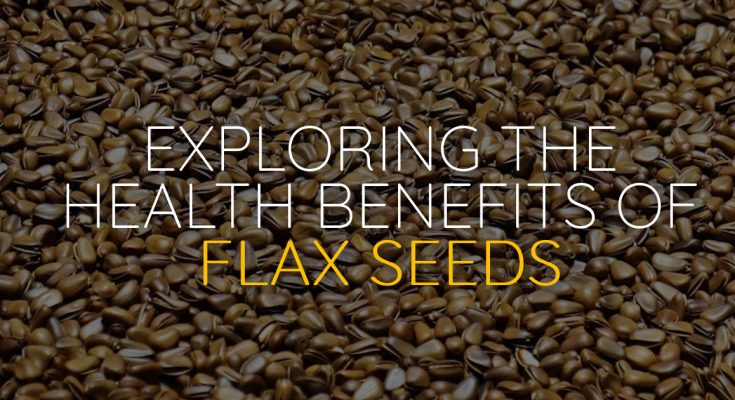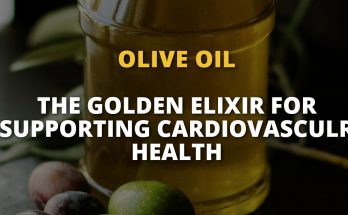When it comes to superfoods, flax seeds rightly earn their spot on the list.
These tiny seeds may be small, but they pack a powerful punch when it comes to their health and nutrition benefits.
From heart health to digestive health, flax seeds are a versatile ingredient that can elevate any dish.
Let’s dive into why flax seeds should be a staple in your diet.
1. Flax Seeds Lower Blood Pressure
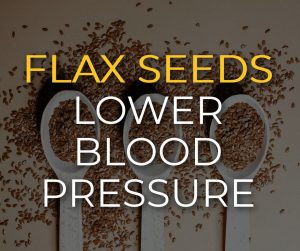
Studies have shown that incorporating flax seeds into your diet can have a positive impact on your blood pressure levels.
High blood pressure, also known as hypertension, is a common yet serious condition that affects millions of people worldwide.
Flax seeds are a great source of many nutrients known to have a positive impact on heart-health and blood pressure such as omega-3 fatty acids, dietary fiber and phytochemicals such as lignans.
A systematic review and dose–response meta-analysis of randomized clinical trials published 2023 assessed the impact of flaxseed supplementation on blood pressure.
The systematic review and meta-analysis concluded:
Supplementation with various flaxseed products significantly reduced SBP and DBP levels, confirming the hypothesis that flaxseed could be used as an effective supplement for blood pressure management, alongside routine medications. – [1]
2. Rich Source Of Omega-3 Fatty Acids (ALA)
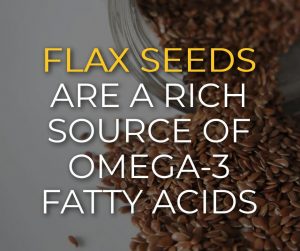
Flax seeds are one of the richest plant-based dietary sources of Omega-3 fatty acids in the form of short-chain ALA (alpha-linolenic acid).
Omega-3 fatty acids have long been praised for their numerous health benefits, from improving heart health to boosting brain function
Flax seeds are a great option for vegetarians and vegans looking to boost their intake of these important essential fats.
One tablespoon of ground flax seeds contains around 1.6g of Omega-3 fatty acids. – [2]
By incorporating flax seeds into your diet, you can easily boost your intake of these essential fatty acids and reap the many benefits they have to offer.
3. Flaxseed Improves Glycemic Control & Metabolic Health
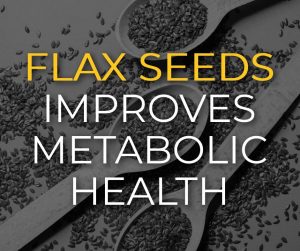
Packed with omega-3 fatty acids, dietary fiber, and lignans, flaxseed is a versatile superfood that can help regulate blood sugar levels and improve overall metabolic health.
One of the key benefits of flaxseed for individuals with diabetes lies in its ability to improve glycemic control.
The soluble fiber found in flaxseed slows down the digestion and absorption of carbohydrates, preventing sudden spikes in blood sugar levels.
This can help individuals with diabetes better manage their blood sugar and reduce their risk of complications associated with uncontrolled blood sugar.
Additionally, flaxseed has been shown to have a positive impact on insulin sensitivity, which is crucial for individuals with type 2 diabetes
However, it is worth noting that not all flaxseed products are equal when it comes to their metabolic health benefits.
The majority of the metabolic health benefits associated with flaxseed appear to be largely obtained from consuming whole flax products, rather than the oil.
This can probably be explained in large part due to the fact that whole flaxseed is a good source of many nutrients, which have a beneficial impact on metabolic health such as the rich dietary fiber content.
A systematic review and meta-analysis published 2021 summarized the evidence from the clinical trials to identify the effectiveness of flaxseed and its products on glycemic indices.
The systematic review and meta-analysis concluded:
The results of this meta-analysis showed reducing fasting blood glucose, HOMA-IR index, and increases the QUICK Index.
In addition, flaxseed lignin reduced the fasting blood glucose, increased the QUICKI index and the decreased HOMA-IR index.
This results remain significant in fasting blood glucose for supplementation with whole flaxseed, in the QUICKI with the whole flaxseed and flaxseed oil, and in HOMA-IR only with whole flaxseed.
These studies suggest that flaxseed and its products improve glycemic indices, but this effect depends on the type of supplement. – [3]
4. Flaxseed Improves Lipid Profile
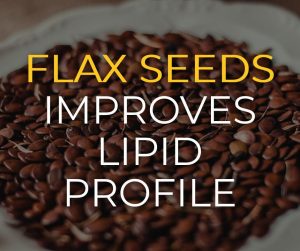
When it comes to improving your lipid profile, a simple addition to your diet could make a significant difference, enter flaxseed.
This tiny seed packs a powerful punch when it comes to promoting heart health and improving numerous lipid related markers such as total cholesterol (TC), triglycerides (TG) and LDL-C (low-density lipoprotein cholesterol).
Flaxseed is one of my top choices of plant-based superfoods for supporting cardiovascular health.
The standard modern Western diet is often severely lacking in nutrients such as Omega-3 fatty acids and fiber, of which flaxseed is an exceptional dietary source of both.
A review of the current scientific evidence evaluating the effect of flaxseed on lipid profile parameters has found:
This meta-analysis suggested that flaxseed supplementation improves serum TC, TG, and LDL-C, which could delay the progression of heart disease. – [4]
Based on results, flaxseed significantly improves the lipid profile in dyslipidemic patients comprising total cholesterol (TC), low-density lipoprotein (LDL-C) and triglyceride (TG) in comparison with the control group.
The evidence suggests that flaxseed significantly improved TC, LDL-C and TG in dyslipidemic subjects and additionally improved the HDL-C on healthy subjects. – [5]
It was concluded that the flaxseed supplementation may have improved the lipid profile. Therefore, it was recommended that flaxseed should be used as an adjuvant anti-hyperlipidemic agent. – [6]
5. Flaxseed Oil Augments Antioxidant Capacity
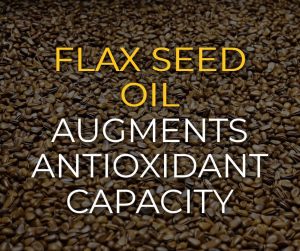
Flaxseeds are also rich in antioxidants such as the polyphenolic compounds lignans, which help protect the body against oxidative stress and free radical damage.
A meta-analysis published 2021 evaluated the impact of flaxseed oil on the serum level of biomarkers of oxidative stress.
The meta-analysis found that flaxseed oil supplementation led to a significant decrease in lipid peroxidation marker malondialdehyde (MDA).
Whilst also increasing total antioxidant capacity (TAC) levels.
Our findings revealed that flaxseed oil supplementation might play a beneficial role in the reinforcement of the antioxidant defense system and amelioration of oxidative stress in adults. – [7]
How To Incorporate Flaxseed Into Your Diet
There are numerous ways to incorporate flax seeds into your diet to reap their nutrition benefits.
You can sprinkle ground flax seeds onto oatmeal, yogurt, or salads, blend them into smoothies, or use them as a binding agent in baked goods.
The possibilities are endless when it comes to adding flax seeds to your meals.
References
[2] Flaxseed – FoodData Central
[3] Flaxseed and its products improve glycemic control: A systematic review and meta-analysis
The information in this article has not been evaluated by the FDA and should not be used to diagnose, cure or treat any disease, implied or otherwise.
Always consult with a qualified healthcare professional before making any significant dietary or lifestyle changes including supplements and herbs.
